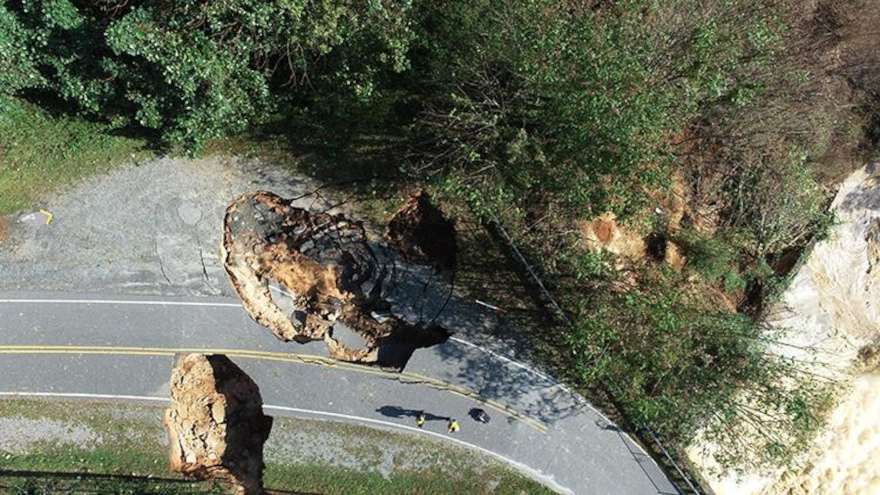Dealers might be seeing ‘double whammy’ impacting inventory & more

One of the nearly 400 damaged roads in western North Carolina is shown in this image taken on Sunday. Photo courtesy of the N.C. Department of Transportation.
By subscribing, you agree to receive communications from Auto Remarketing and our partners in accordance with our Privacy Policy. We may share your information with select partners and sponsors who may contact you about their products and services. You may unsubscribe at any time.
The Federal Emergency Management Agency (FEMA) is leading the disaster response in Alabama, Florida, Georgia, South Carolina, North Carolina and Tennessee after the devasting flooding and storm surge created by Hurricane Helene last week.
Meanwhile, Todd Caputo, president of Todd Caputo Consulting, sees a multifront storm potentially impacting the used-car industry, too, and not just in the Southeast.
Via multiple posts on LinkedIn, Caputo explained how the combination vehicles damaged or destroyed by Helene, coupled with a labor dispute happening at multiple ports where new vehicles enter the U.S., is creating a storm that dealership managers could be seeing for the foreseeable future.
“Hurricane Helene has brought widespread damage, particularly to vehicles. But if the longshoreman strike on the East Coast and Gulf ports goes forward, the car market could face an even bigger challenge — a double whammy of supply chain disruptions,” Caputo wrote on LinkedIn.
With officials saying as much as 30 inches of rain fell in western North Carolina and water inundating coastal areas of Florida, Caputo began by pointing out lots of flooded vehicles could be impacted.
“Thousands of vehicles will be damaged or totaled, leading to a surge in demand for replacements,” Caputo wrote. “However, it could take weeks — if not months — for insurance companies to process claims and issue payments. Dealers need to be prepared for a wave of customers who will gradually enter the market, depending on when their claims are settled.
Subscribe to Auto Remarketing to stay informed and stay ahead.
By subscribing, you agree to receive communications from Auto Remarketing and our partners in accordance with our Privacy Policy. We may share your information with select partners and sponsors who may contact you about their products and services. You may unsubscribe at any time.
“After major hurricanes, the market often sees a rise in flood-damaged vehicles with salvage titles,” he continued in another LinkedIn post. “Rebuilders will acquire these cars, repair them, and put them back into the market. For consumers, it’s essential to be cautious and fully understand a vehicle’s history before purchasing.
“Some of the flood-damaged cars that aren’t rebuilt here in the U.S. will be exported, which could tighten the domestic supply further—especially for lower-end, budget-friendly vehicles,” Caputo added.
Caputo pointed out those ingredients could push wholesale prices higher. But then, the industry consultant noted another storm brewing.
“If the strike affects major ports like Newark, Baltimore, Brunswick, and Houston, it will disrupt the flow of new cars coming in from overseas,” Caputo said. “This means fewer vehicles from brands like Hyundai, Kia, BMW, Mercedes, Nissan, and Volkswagen — especially for the East Coast and Southern states. The supply of new cars will tighten, pushing even more buyers into the used-car market.”
And if those two situations weren’t enough, Caputo mentioned dealership service drives might be impacted, too.
“Don’t forget the parts,” Caputo said. “Many parts are imported from overseas, and any disruption at the ports will make it harder for dealerships and repair shops to get the parts they need. This will lead to longer repair times for customers and more frustration.
Caputo summed up his observations this way.
“The bottom line: Between the hurricane-related vehicle losses and the potential for major port disruptions, the car market is about to enter a very challenging period. Dealers will need to adapt quickly — both in terms of securing inventory and communicating with customers about potential delays,” said Caputo, who mentioned dealers seeking more guidance can reach him at (315) 289-7979, via email at [email protected] or via his website at www.toddcaputoconsulting.com.


